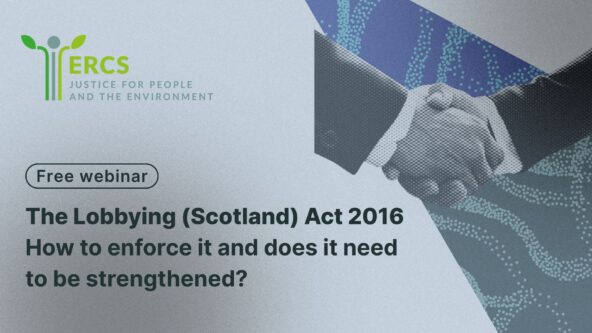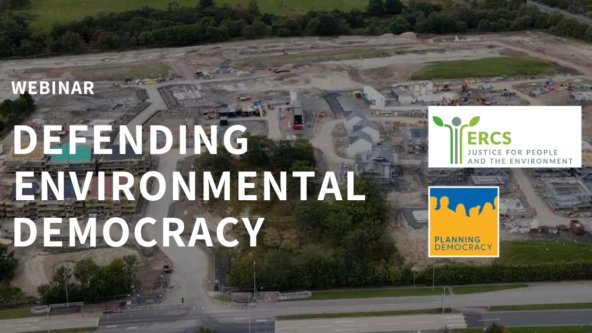Defending environmental democracy: Why have newts and bats become public enemy number one?
By Clare Symonds, Chief Officer at Planning Democracy
On 25 March, ERCS and Planning Democracy hosted a webinar on defending environmental democracy. We held the webinar in response to the current hostility being displayed towards planning and environmental concerns, and the UK government’s embrace of a deregulatory, growth-at-all-costs agenda. Against the backdrop of public participation in environmental decision-making being dismissed as NIMBYism, rather than a fundamental pillar of a democratic society, we wanted to bring people together to discuss how we can mobilise in defence of our environmental rights.
Speaking at the webinar were writer and broadcaster Lesley Riddoch; Laurie Macfarlane from Future Economy Scotland; and Malcolm Tait, Professor of Planning at Sheffield University with Dr Kiera Chapman from Oxford University. Malcolm and Kiera run Planning for Nature with Planning Democracy and Scottish Environment LINK as partners.
The speakers were extraordinary in summarising the situation in an entertaining and non-technical manner. It was heartening to see such a positive and engaged response as over a hundred people engaged in lively chat.
Here is a summary of what was said. If you were unable to join the webinar on the day, recording of the webinar on defending environmental democracy is available to watch online. Please do share the link widely!
Context on current challenges in politics, land use and planning
Laurie began outlining the political and economic context and the centrality of land use to addressing 21st century challenges. He talked about the economics of development and the environmental crisis, and why tackling this requires a strengthened and more democratic planning system. He explained about the erosion of the planning system in response to vested interests, and the prioritisation of shareholder interests over the public interest and why creating a more democratic and proactive planning system is critical to building sustainable places that caters to human needs.
Erosion of environmental democracy in English planning reform
Malcolm and Kiera focussed on planning explaining how the state of debate within planning is myopically focused on policy tweaks, interpretation, and process. With the consequence being a reduction in attention on the material outcomes of development. They argued that democratic participation is being squeezed out of planning in favour of technical ‘solutions’ and centralised policy. The so called ‘win-win’ environmental policies are necessarily developed as a means of excluding communities, their concerns for the qualities of individual sites and places.
Democratic participation is now seen as antithetical to a ‘growth agenda’, even though those communities will have to live with the consequences of this growth. The Planning for Nature project will be tackling this problem in more depth.
Lack of local democracy in Scotland
Finally, Lesley gave us some shocking statistics about the state of democracy in Scotland and suggested the reasons for the low election turnouts and community disempowerment. She gave examples of community enterprises elsewhere and in Scotland showing how communities are filling this void.
To hear about future webinars and keep up to date on our work on environmental democracy, subscribe to ERCS’s newsletter and Planning Democracy’s mailing list.







